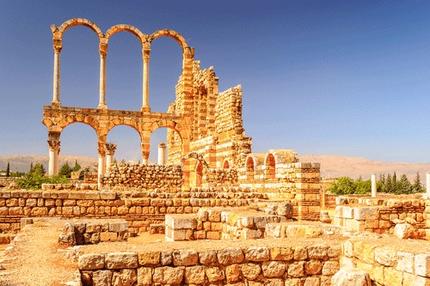LAU and Mediterranean partners present Umayyad Route packages
An enterprising project incorporating LAU’s Urban Planning Institute brings the Umayyad Dynasty into the limelight.
Thirteen organizations from seven countries bordering the Mediterranean Sea came together in 2012 to develop a touristic/cultural itinerary that highlights the Umayyad history shared by their countries.
Among them was the Urban Planning Institute at LAU, which this month hosted representatives of all the project partners, as well as Lebanese tour operators, for a presentation of the itineraries produced during the past three years of collaborative work.
Founder of the institute and LAU coordinator for the Umayyad Route project professor Rachid Chamoun led the presentations by highlighting the importance of local partnership. “The ministries of culture and tourism played an active and important role, as did our long-term partners the Safadi Foundation and the municipalities of Byblos and Anjar.”
Assistant Provost for Special External Projects Wassim Shahin emphasized the enterprising nature of the project in his welcoming address. “LAU’s new strategic plan highlights a decision to reposition itself as an entrepreneurial university. This involves the development of university-business relationships and has a direct impact on community engagement,” said Shahin, underscoring the Umayyad Route project as a clear demonstration of this ambition.
The primary goal of the project, made possible through a grant of over four million euros from the European Commission, is to improve Mediterranean territorial cohesion by implementing an integrated strategy that enhances the cultural heritage of the Umayyad dynasty.
Abdallah Kahil, associate professor at the Department of Architecture and the director of the LAU Institute of Islamic Art and Architecture, gave the audience an overview of the Umayyad dynasty which dominated in the Middle East between 661 and 750 AD and in the Iberian Peninsula (al-Andalus) between 756 and 1031 AD.
“There is no one way to interpret a period of history. The Abassids wrote about the Umayyads in one way, the Spanish in another. Now we view the region they held as a basin of development of all cultures,” said Kahil, citing the Umayyad era as the first to introduce the dynastic system of political governance and a time of great cultural exchange between Europe and the Muslim countries of the Middle East. “The touristic routes developed reflect not only sites held and built by the Umayyads, but also areas through which they travelled and which were impacted by their legacy.”
Following presentations of the various routes, itineraries and packages developed for tourists in Spain, Portugal, Italy, Tunisia, Jordan and Egypt, Assistant Professor of Ancient and Classical Archeology at the Lebanese University Wissam Khalil expounded on those devised in Lebanon. In addition to one- and two- day itineraries, a seven-day tour not only takes in Umayyad sites but also prominent Roman and Byzantine ruins.
The route includes the Umayyad mosque in Baalbek and the well-preserved Umayyad City of Anjar, as well as landmarks in Beirut, Sidon, the Chouf, the Cedars, Tripoli, Anfe and Byblos. “Different styles of architecture can be seen across the route,” said Khalil, pointing up the reuse of Roman elements in various places, the Byzantine techniques evident in Anjar and the majestic Baalbek with its many architectural remains.
The crown jewel of the Umayyad Route project, apart from the splendor of Umayyad architecture, is to be built in the coming months in Anjar where the local municipality has agreed to host an Umayyad museum.
Read more about the museum and the various Umayyad themed itineraries developed in the seven Mediterranean countries at http://umayyad.eu
More
Latest Stories
- This Summer: Robotics and Artificial Intelligence Summer School for Middle Schoolers
- Into the Psychology of Justice
- Alumnus Zak Kassas on Navigation, Spoofing and the Future of GPS
- Hearing Between the Lines
- LAU Hematology Conference 2025: Advancing Science Through Interdisciplinary Exchange
- Dr. Chaouki T. Abdallah Invested as LAU’s 10th President
- LAU Guides Its Students Through the Code of Conduct
- Innovative Procedure at LAU Medical Center–Rizk Hospital Signals Hope for a Patient With a Congenital Disease


